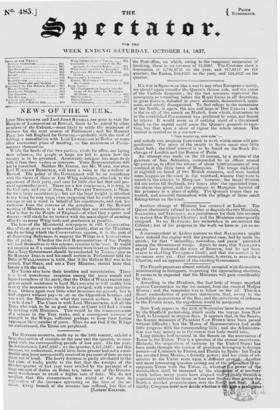NEWS OF THE WEEK.
LORD MELBOURNE and Lord JOHN RUSSELL are gone to visit the Marquis of LANSDOWNE at Bowood, there to be joined by other members of the Cabinet,—most likely to settle the minimum of business for the next session of Parliament ; and Sir ROBERT PEEL has left England for Germany,—probably with the view of holding a consultation with Lord LYNDHURST at Baden or some other convenient place of meeting, on the maximum of Podia- mentarv obstruction.
While the heads of the two parties, rivals for office, are laying their schemes, the people at large are left to guess how the country is to be governed. Aristocratic intrigue has more to do with it than their wishes or interests. Their Representatives will not be consulted. Neither Mr. GROTE, nor Mr. WARD, nor even Lord WILLIAM BENTINCK, will have a voice in the conclave at Bowood. The policy of the Government will be in accordance with the views of three or four Whig noblemen, who look to the suplemacy of their party, and care for little else but that and per- sonal aggrandizement. There are a few commoners, it is true, in the Cabinet; and one of them, Mr. POULETT THOMSON, 18 Mem- ber for a large constituency ; but not the least weight is attached to any thing he may urge, even supposing that he could summon courage to say a word in behalf of his constituents, and risk his exclusion from the coteries of the grandees. At the Bowood meeting- of Ministers, it is not credible that any consideration of what is due to the People of England—of what they require and deserve—will clash for an instant with the main object of securing office for as many Whig lords and gentlemen as possible. The tone of the Ministerial newspapers is still Conservative. One of them gives us to understand plainly, that as the Ministers can do nothing which the Conservatives oppose, it is the part of all discerning Reformers to support the Whigs in a Conservative line of policy. Whether the real Representatives of the People will lend themselves to this scheme, remains to be tried. It would not surprise us if a considerable number were to act on the opinion that a Tory Government should be conducted by Tories,—just as Sir ROBERT INGLIS and his small section in Parliament told the Duke of WELLINGTON in 1832, that if the Reform Bill was to be carried, Earl GREY, and not a Tory Minister, should have that honour with the risk.
The Tories also have their troubles and uncertainties. There is a 'nest unwelcome suspicion among the more stanch and legotrd members of the party, tbat the Duke of WELLINGTON may gi%e as much assistance to Lord MELBOURNE as will enable him to carry the measures to which he is pledged, with some modifica- tiois. Others again care little what measures are passed; but to lend support without pay—to sit on the Opposition benches and lute with the Minister—is what they cannot endure. Yet what ti to be dune? The Court is with Lord MELBOURNE, aad all the Tories who wish to be on good terms at Court will find a reason fur dividing with Ministers. This would be the commencement of a schism in the Tory ranks, and a consequent increase of streugth to the Whigs, sufficient perhaps to keep their faction uppermost for a number of years. Thus we sec that if the Whigs are embarrassed, the Tories are perplexed.


























